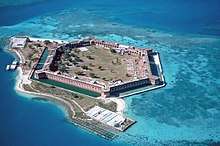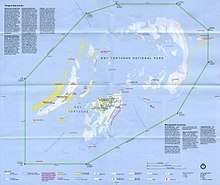Dry Tortugas National Park
Dry Tortugas National Park is a United States National Park that contains a cluster of islands about 70 mi (110 km) west of Key West, Florida, on Garden Key.
Understand

History
Construction of Fort Jefferson was begun in 1846 but never completed. President Franklin Roosevelt declared it and the waters surrounding it a National Monument in 1935.
Landscape
Flora and fauna
Climate
The Dry Tortugas exist in a subtropical climate. Temperatures range from the mid-50s to mid-80s (°F). April and May are often idyllic. There are essentially two seasons: The winter season (December-March), which can be windy with rough seas, and the tropical storm season (June-November) during which Dry Tortugas experiences both hot, humid weather and calm seas or severe weather events. Due to the ever-changing weather patterns, an accurate weather forecast is recommended before your visit.
Get in

The park is open year round during daylight hours, and is only accessible by boat or seaplane.
- Key West Seaplane Service.
- Yankee Freedom III.Boarding is at the Ferry Terminal at the foot of Grinnell Street in Key West, FL.
Fees and permits
A seven-day pass is $5 for adults.
There are several passes for groups traveling together in a private vehicle or individuals on foot or on bike. These passes provide free entry at national parks and national wildlife refuges, and also cover standard amenity fees at national forests and grasslands, and at lands managed by the Bureau of Land Management and Bureau of Reclamation. These passes are valid at all national parks including Dry Tortugas National Park:
- The $80 Annual Pass (valid for twelve months from date of issue) can be purchased by anyone. Military personnel can obtain a free annual pass in person at a federal recreation site by showing a Common Access Card (CAC) or Military ID.
- U.S. citizens or permanent residents age 62 or over can obtain a Senior Pass (valid for the life of the holder) in person at a federal recreation site for $80, or through the mail for $90; applicants must provide documentation of citizenship and age. This pass also provides a fifty percent discount on some park amenities. Seniors can also obtain a $20 annual pass.
- U.S. citizens or permanent residents with permanent disabilities can obtain an Access Pass (valid for the life of the holder) in person at a federal recreation site at no charge, or through the mail for $10; applicants must provide documentation of citizenship and permanent disability. This pass also provides a fifty percent discount on some park amenities.
- Individuals who have volunteered 250 or more hours with federal agencies that participate in the Interagency Pass Program can receive a free Volunteer Pass.
- 4th graders can receive an Annual 4th Grade Pass that allows free entry for the duration of the 4th grade school year (September-August) to the bearer and any accompanying passengers in a private non-commercial vehicle. Registration at the Every Kid in a Park website is required.
In 2018 the National Park Service will offer four days on which entry is free for all national parks: January 15 (Martin Luther King Jr. Day), April 21 (1st Day of NPS Week), September 22 (National Public Lands Day), and November 11 (Veterans Day weekend).
Get around
This is a cluster of 7 small islands. As such the only way to reach them (and travel between them) is by boat or seaplane.
The largest of the islands, Garden Key, hosts Fort Jefferson. Walking tours are provided and snorkeling is a must. All traffic is on foot.
See
- Fort Jefferson.
Do
- Camping.
- Snorkel.
- Guided fishing trips.
- Guided wildlife viewing trips.
- Sailing charters.
and you can go diving there.
Buy
- Gift Shop. A small National Park Service Gift Shop is available inside Fort Jefferson on Garden Key. It offers a very limited selection of items.
Eat
Drink
Sleep
Lodging
Camping
Some camping is available. It is $3/person per night.
Backcountry
Stay safe
The invasive lionfish has been spotted around Fort Jefferson. They can be identified by their red and cream colour and long spines. Stings are excruciatingly painful and can be fatal. Any sighting of the fish should be reported to National Park Staff immediately.